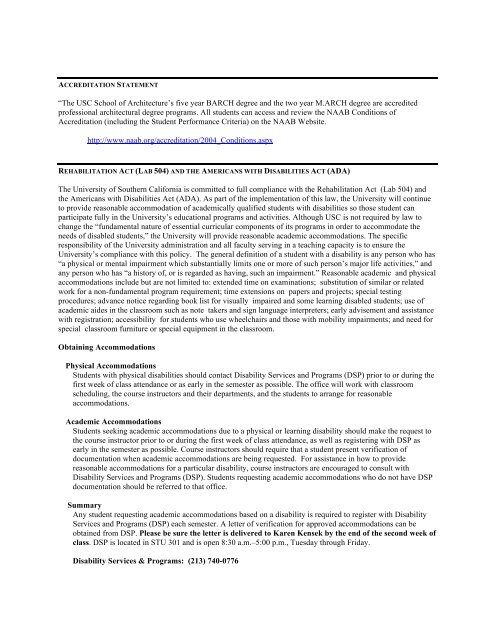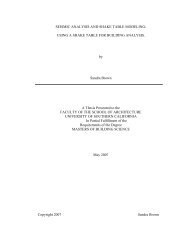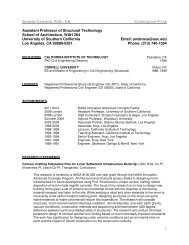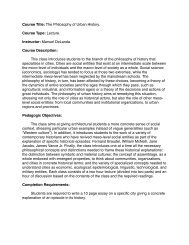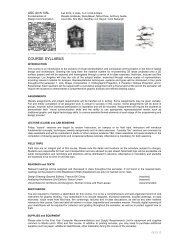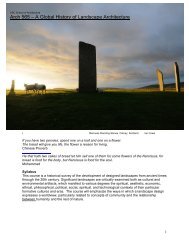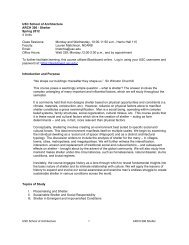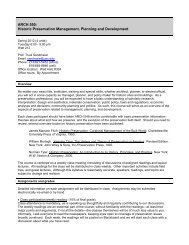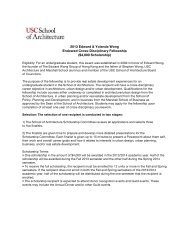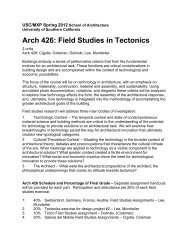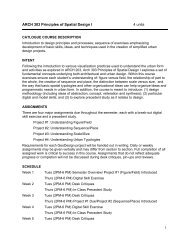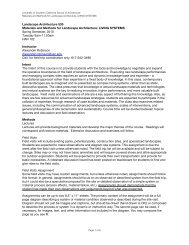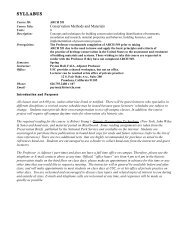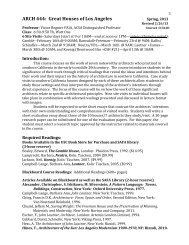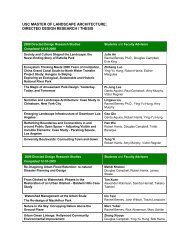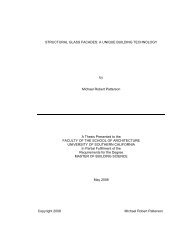sp12_syllabus_526_v13_JD Karen - USC School of Architecture
sp12_syllabus_526_v13_JD Karen - USC School of Architecture
sp12_syllabus_526_v13_JD Karen - USC School of Architecture
Create successful ePaper yourself
Turn your PDF publications into a flip-book with our unique Google optimized e-Paper software.
ACCREDITATION STATEMENT<br />
“The <strong>USC</strong> <strong>School</strong> <strong>of</strong> <strong>Architecture</strong>’s five year BARCH degree and the two year M.ARCH degree are accredited<br />
pr<strong>of</strong>essional architectural degree programs. All students can access and review the NAAB Conditions <strong>of</strong><br />
Accreditation (including the Student Performance Criteria) on the NAAB Website.<br />
http://www.naab.org/accreditation/2004_Conditions.aspx<br />
REHABILITATION ACT (LAB 504) AND THE AMERICANS WITH DISABILITIES ACT (ADA)<br />
The University <strong>of</strong> Southern California is committed to full compliance with the Rehabilitation Act (Lab 504) and<br />
the Americans with Disabilities Act (ADA). As part <strong>of</strong> the implementation <strong>of</strong> this law, the University will continue<br />
to provide reasonable accommodation <strong>of</strong> academically qualified students with disabilities so those student can<br />
participate fully in the University’s educational programs and activities. Although <strong>USC</strong> is not required by law to<br />
change the “fundamental nature <strong>of</strong> essential curricular components <strong>of</strong> its programs in order to accommodate the<br />
needs <strong>of</strong> disabled students,” the University will provide reasonable academic accommodations. The specific<br />
responsibility <strong>of</strong> the University administration and all faculty serving in a teaching capacity is to ensure the<br />
University’s compliance with this policy. The general definition <strong>of</strong> a student with a disability is any person who has<br />
“a physical or mental impairment which substantially limits one or more <strong>of</strong> such person’s major life activities,” and<br />
any person who has “a history <strong>of</strong>, or is regarded as having, such an impairment.” Reasonable academic and physical<br />
accommodations include but are not limited to: extended time on examinations; substitution <strong>of</strong> similar or related<br />
work for a non-fundamental program requirement; time extensions on papers and projects; special testing<br />
procedures; advance notice regarding book list for visually impaired and some learning disabled students; use <strong>of</strong><br />
academic aides in the classroom such as note takers and sign language interpreters; early advisement and assistance<br />
with registration; accessibility for students who use wheelchairs and those with mobility impairments; and need for<br />
special classroom furniture or special equipment in the classroom.<br />
Obtaining Accommodations<br />
Physical Accommodations<br />
Students with physical disabilities should contact Disability Services and Programs (DSP) prior to or during the<br />
first week <strong>of</strong> class attendance or as early in the semester as possible. The <strong>of</strong>fice will work with classroom<br />
scheduling, the course instructors and their departments, and the students to arrange for reasonable<br />
accommodations.<br />
Academic Accommodations<br />
Students seeking academic accommodations due to a physical or learning disability should make the request to<br />
the course instructor prior to or during the first week <strong>of</strong> class attendance, as well as registering with DSP as<br />
early in the semester as possible. Course instructors should require that a student present verification <strong>of</strong><br />
documentation when academic accommodations are being requested. For assistance in how to provide<br />
reasonable accommodations for a particular disability, course instructors are encouraged to consult with<br />
Disability Services and Programs (DSP). Students requesting academic accommodations who do not have DSP<br />
documentation should be referred to that <strong>of</strong>fice.<br />
Summary<br />
Any student requesting academic accommodations based on a disability is required to register with Disability<br />
Services and Programs (DSP) each semester. A letter <strong>of</strong> verification for approved accommodations can be<br />
obtained from DSP. Please be sure the letter is delivered to <strong>Karen</strong> Kensek by the end <strong>of</strong> the second week <strong>of</strong><br />
class. DSP is located in STU 301 and is open 8:30 a.m.–5:00 p.m., Tuesday through Friday.<br />
Disability Services & Programs: (213) 740-0776


